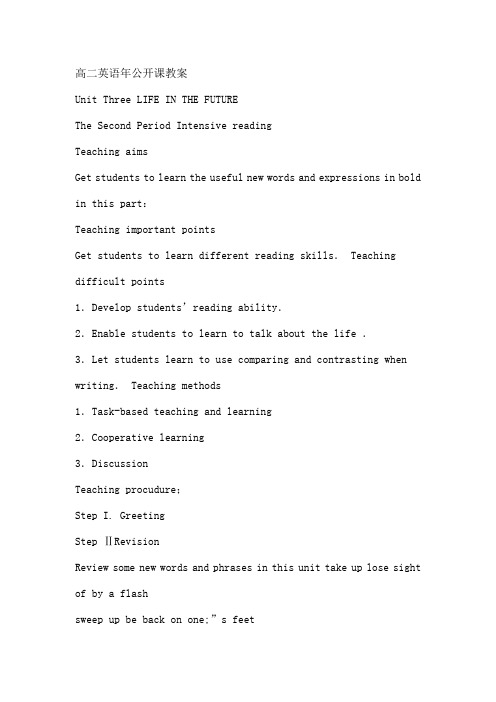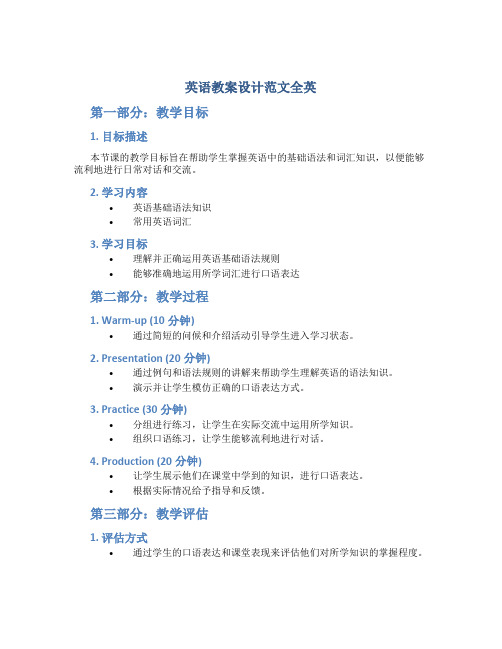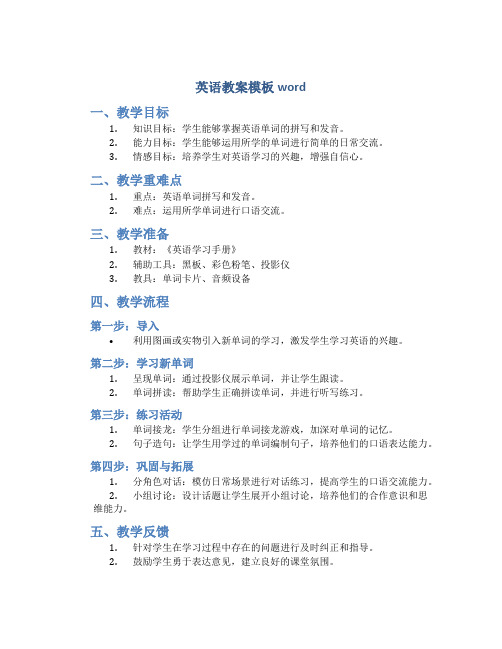全英文教案 Microsoft Word 文档
四年级英语教案Microsoft Word 文档

四.英汉互译
1.very good-------
2.great---------
3.早餐吃什么…。
板书课题《What’s for breakfast?〉
设置情景:Oh! It’s 7:00. It’s time for breakfast. What’s for breakfast?让学生以自己早饭为基准,结合所学的内容回答。I have soup for breakfast. I have cakes for breakfast. We have eggs and greens for breakfast.…引入更多的食物名称。
2.出示更多的食物卡片,反复问答练习。让学生与周围的同学自由作问答。
3.注意正确使用不可数名词和
可数名词的单复数。
三.巩固练习
1.对话练习,听课本录音对话回答What’s for breakfast? And what’s for lunch?跟读对话。
2.分角色朗读并鼓励。
3.让学生填写自己的空白卡片,进行自由互换练习。
导
学
环
节
前置
作业
1.预习新单词与课文。
2.教师准备本课单词卡片。
学生探究活动
教师导学过程及时间分配
小组交流、
展示点拨、
训练拓展
热身(Warming up)
1.Greetings.
Hellow,boys and girls!
How are you?
Nice too meet you!
2.唱歌曲“I’m hungry”.
2.掌握并能运用句型:What’s for breakfast / lunch / ?We have…for breakfast / lunch / .
(完整word)全英文英语教案模板

Lesson planNSEFC Module2 Unit Reading InTeacher:Period:Period1Type:ReadingDuration: 45minutesTeaching ideologyThe current theory view reading as a interactive process which involves not only the printed pagebut also the reader's old knowledge of the language in general, the world and the text types.In the reading process, these factors interact with each other and compensate for each other。
Based on the understanding of reading as an interactive process, teaching reading in the classroomis divided into three stages in which the top—down and bottom—up techniques integrated to developthe students language efficiency in general and reading strategies. The three stages are pre—reading, while-reading and post-reading.Teaching material and learning conditionThe analysis of teaching materialThe teaching material is the reading part from NSEFC Module2 Unit . The topic of this unitis . This passage mainly introduces 。
英语教案MicrosoftWord文档

六年级英语上册第一单元教案Unit1、Ann’s dream一、教学目标与要求(Teaching contents and demands)1、技能目标:(ability aim)①能够理解was,were,had表达的是过去时间里发生的事情。
②能够模仿I had a dream last mother was at home yesterday.等句式,表达自己和他人在过去时间里所做的事情。
③能够用本单元主要句式询问对方或他人在过去时间的处所,如:Where were you yesterday? Where was Jim yesterdayafternoon?④能够理解本单元故事。
2、知识目标(Knowledge aim)①语音:了解字母R和L在单词中的发音,并能区分他们发音的不同。
②词汇:能听、说以下单词:Mars, Martiam, soon, beanstalk,strong, dead能认读以下单词:space, sait, planet, air, the earth, friendly能够使用以下单词:fan,dream,spaceship,astronaut,afraid,yesterday及短语last night。
③句型:Where were you? Where was Wang Ling? We were in awas at home. She was at school. There was no water. There were no trees.④语法:能够初步了解一般过去时态的用法及动词has,have,be(am,is,are)的过去式has,was,were.3、情感态度目标(Emotion aim)①能通过故事中Ken和Ann与火星人友好交往这一事例启发引导学生形成与人友善的态度。
②通过遨游太空的故事丰富学生天文知识,激发学生乐于观察,对宇宙空间充满好奇且乐于探究的热情。
英语教案 Microsoft Word 文档

高二英语年公开课教案Unit Three LIFE IN THE FUTUREThe Second Period Intensive readingTeaching aimsGet students to learn the useful new words and expressions in bold in this part:Teaching important pointsGet students to learn different reading skills. Teaching difficult points1.Develop students’reading ability.2.Enable students to learn to talk about the life .3.Let students learn to use comparing and contrasting when writing. Teaching methods1.Task-based teaching and learning2.Cooperative learning3.DiscussionTeaching procudure;Step I. GreetingStep ⅡRevisionReview some new words and phrases in this unit take up lose sight of by a flashsweep up be back on one;”s feetswitch to be lacking in previous toleave a good impression on sb slide intoStep ⅢReadi ng1. Scan the passage and find out the answers1. Who wrote this e-mail?2. Who is the e-mail for?3. What is his e-mail?4. How did he feel when he left his own time?5. How did he get to the year 3008?6. What did he notice first when he arrived in AD3008?2. Explain some language points and the past participle used as the adverbial1).take up /on/away/over/care ofIf I didn”t take up the challenge, it would mean I failed 2).tolerate/put up with/stand/ bearWe cannot tolerate cheating in exams3).be lacking in/lack for nothing/no lack ofThe teacher said the child was lacking in confidence= The teacher said the child lacked confidence4).lose sight of/out of sightcatch sight of/ in sightHer father didn”t leave until he lost sight of her3. Read the passage carefully and fill in the blanks with proper words or phrases. Check the answers with the whole classDear Mun and Dad,I___my prize that was wan last year so that I could travel to the year AD3008.As I ___time lag, which is ___the jet leg, my friend, Wang ping gave me some green tablets. Then we got into a capsule though a small ___.a few minutes later, we arrived. In the new surroundings, I was hit by the ___ fresh air. My head ached. Wangping handed me a___ and said,‘put it on and it will make you f eel much better”. I felt better ___.then I followed him to collect a havering carriage driven by computer.just when we reached what looked like a large market,I ____Wangping.he was ___into the center of fling carriages.Arriving at a strange-looking house.he showed me into a large, bright room. In the house I had a brief meal and a hot bath, exhausted,I ___bed and fell fast asleep. More news later from your loving son.Li Qiang4. Read the passage aloud, pay attention to the rhythm and intonationStep Ⅳ Pra ctiseIf time permits. Do the exercises in WB P29.check the answersStep Ⅴ Homework1.Learn all the useful new words and expressions in this part by heart.2.Read the passage again after class and finish exercisesin WB。
英语教学设计3MicrosoftWord文档

PEP小学英语六年级上册第五单元教学设计【单元教材分析】本单元的教学内容是使学生掌握一些职业的英语表达并就此展开相关讨论,能够简单介绍人物职业,会询问他人的工作情况并给出相应的回答。
了解英语中职业名称对于不同性别的差异。
重点句型有:What does your mother/father do? Where does she/he work? How does s he/he go to work? 在教学中结合学生实际情况,运用学生已学本册教材一单元内容,以“How does he go to work?”等相关知识点为“How does she/he go to work?”的教学做铺垫。
还可以适当的进行拓展延伸。
本单元的教重点是使学生掌握一些职业的英语表达如:What does your mother do? Where does she work? How does she go to w ork? 本单元的难点是让学生在任务活动中熟练运用不同句型进行交流。
【单元教学目标】1.能力目标(1)能够简单介绍人物职业,如:She’s a teacher.能够运用句型“What does your mother do? Where does she work? How does she go to work?”等询问他人工作情况,并给出相应回答。
(2)能够按要求较好完成Group work等活动。
(3)能够听懂、会唱歌曲“My family”。
2.知识目标(1)能够掌握A. B部分Let’s learn, Let’s talk中的四会单词和句子。
(2)能够听、说、认读A B部分Let’s talk, Let’s read中的白体句子。
(3)了解元音和辅音的发音并读出例词。
(4)了解Story time, Good to know等部分的内容。
3.情感、策略、文化等有关目标(1)情感态度:热爱生活,尊重他人劳动。
教案MicrosoftWord文档

《教案Microsoft Word文档》一、前言1. 教案概述:本教案旨在通过讲解和练习,使学员熟练掌握Microsoft Word 的基本操作和功能,提高文档编辑和排版能力。
2. 适用对象:本教案适用于具有一定计算机基础知识的学员。
3. 教学方法:采用讲授、演示、实践相结合的教学方法。
二、教学目标1. 掌握Word的启动和退出方法。
2. 熟悉Word界面及主要功能按钮。
3. 学会创建、保存、打开和关闭文档。
4. 掌握文本的输入、编辑和删除方法。
5. 学会设置字体、段落格式和页面布局。
三、教学内容1. 第一课时:Word的基本操作1.1 启动和退出Word1.2 熟悉Word界面1.3 创建、保存、打开和关闭文档1.4 文本的输入、编辑和删除2. 第二课时:字体和段落格式设置2.1 设置字体格式2.2 设置段落格式2.3 实践操作:制作一份简单的文档3. 第三课时:页面布局和打印设置3.1 设置页面布局3.2 设置页边距3.3 设置页眉页脚3.4 打印文档四、教学过程1. 课堂讲解:讲解每个功能按钮的作用和操作方法。
2. 演示操作:教师演示每个功能的操作过程。
3. 学员实践:学员跟随教师操作,巩固所学内容。
4. 课后作业:布置相关练习,巩固所学知识。
五、教学评价1. 学员能熟练启动和退出Word。
2. 学员熟悉Word界面及主要功能按钮。
3. 学员能独立创建、保存、打开和关闭文档。
4. 学员能熟练进行文本的输入、编辑和删除。
5. 学员能设置字体、段落格式和页面布局。
6. 学员能完成课后作业,展示所学成果。
六、教学资源1. 教材:《Microsoft Word 2024入门与提高》2. 教学PPT3. 练习文档4. 视频教程七、教学环境1. 计算机房2. 投影仪3. 计算机操作系统:Windows 104. Microsoft Word 2024八、教学策略1. 循序渐进:从基本操作到高级功能,逐步讲解和练习。
英语教案设计范文全英

英语教案设计范文全英
第一部分:教学目标
1. 目标描述
本节课的教学目标旨在帮助学生掌握英语中的基础语法和词汇知识,以便能够流利地进行日常对话和交流。
2. 学习内容
•英语基础语法知识
•常用英语词汇
3. 学习目标
•理解并正确运用英语基础语法规则
•能够准确地运用所学词汇进行口语表达
第二部分:教学过程
1. Warm-up (10分钟)
•通过简短的问候和介绍活动引导学生进入学习状态。
2. Presentation (20分钟)
•通过例句和语法规则的讲解来帮助学生理解英语的语法知识。
•演示并让学生模仿正确的口语表达方式。
3. Practice (30分钟)
•分组进行练习,让学生在实际交流中运用所学知识。
•组织口语练习,让学生能够流利地进行对话。
4. Production (20分钟)
•让学生展示他们在课堂中学到的知识,进行口语表达。
•根据实际情况给予指导和反馈。
第三部分:教学评估
1. 评估方式
•通过学生的口语表达和课堂表现来评估他们对所学知识的掌握程度。
2. 评估标准
•能够准确使用所学语法知识进行口语表达
•能够流利地进行日常对话和交流
第四部分:课堂总结
通过本节课的学习,学生应该掌握了日常英语中的基础语法知识和常用词汇,能够更加流利地进行英语口语表达。
希望同学们在日常生活中多加练习,巩固所学知识,提高自己的英语能力。
以上是本节课的教案设计范文,希望对教师有所帮助。
英语教案模板word

英语教案模板word一、教学目标1.知识目标:学生能够掌握英语单词的拼写和发音。
2.能力目标:学生能够运用所学的单词进行简单的日常交流。
3.情感目标:培养学生对英语学习的兴趣,增强自信心。
二、教学重难点1.重点:英语单词拼写和发音。
2.难点:运用所学单词进行口语交流。
三、教学准备1.教材:《英语学习手册》2.辅助工具:黑板、彩色粉笔、投影仪3.教具:单词卡片、音频设备四、教学流程第一步:导入•利用图画或实物引入新单词的学习,激发学生学习英语的兴趣。
第二步:学习新单词1.呈现单词:通过投影仪展示单词,并让学生跟读。
2.单词拼读:帮助学生正确拼读单词,并进行听写练习。
第三步:练习活动1.单词接龙:学生分组进行单词接龙游戏,加深对单词的记忆。
2.句子造句:让学生用学过的单词编制句子,培养他们的口语表达能力。
第四步:巩固与拓展1.分角色对话:模仿日常场景进行对话练习,提高学生的口语交流能力。
2.小组讨论:设计话题让学生展开小组讨论,培养他们的合作意识和思维能力。
五、教学反馈1.针对学生在学习过程中存在的问题进行及时纠正和指导。
2.鼓励学生勇于表达意见,建立良好的课堂氛围。
六、作业布置1.背诵新学单词,并按要求进行书面练习。
2.准备下节课角色对话的台词。
七、教学反思1.回顾本节课的教学过程,总结教学中的亮点和不足。
2.收集学生反馈意见,不断完善教学设计,提高教学效果。
通过以上教学设计,希望能够激发学生对英语学习的热情,提高他们的语言能力,让英语学习变得更加轻松愉快。
- 1、下载文档前请自行甄别文档内容的完整性,平台不提供额外的编辑、内容补充、找答案等附加服务。
- 2、"仅部分预览"的文档,不可在线预览部分如存在完整性等问题,可反馈申请退款(可完整预览的文档不适用该条件!)。
- 3、如文档侵犯您的权益,请联系客服反馈,我们会尽快为您处理(人工客服工作时间:9:00-18:30)。
Unit4 I have a pen pal2008-1-7 10:16:59适用学科:英语适用年级:五年级浏览次数:590 关键字:Unit4 I have a pen pal星级状态:★问题提出Teaching PlanBy Jin Chaodan Topic: PEP B7 Unit4 I have a pen pal Part B Let’s learn Let’s practise . Teaching aims1.Enable the Ss to master the verbs’ form of singular personal pronouns: lives, teaches, goes, watches and reads.2. Enable the Ss to master the sentence patterns:Does your pen pal live in Shanghai? No, he doesn’t.He lives in Beijing.Teaching difficulties pointsTo be able to use the following words: goes, watches, teaches,readsPrepare before the lessonStudents’ book , word cads.Teaching steps:Step1: Warm-up1. Greetings: Introduce myself.How do you feel?What day is it today? It’s Thursday.What do you usually do/have on Thursdays? I usually …Do you usually climb mountains/water the flowers/plant thetrees?2. Let the students ask me some questions.3. Free talk: something about what they do every day.(Practise sentence form “Do you ….? Yes, I do/ No, I don’t)Step2: Presentation1.Still talk with the students, talk about their teachers, their best friends,their parents, and so on.(Lead them to use “ Yes, he / she does. / No, he / she doesn’t.” to answer the question “Does he / she ….?”2. Talk about if the students have their pen pals. Talk about their daily life.Then, tell them I have a pen pal, too. His name’s Zhou Jielun. He’s not the super singer, but a common teacher.Ask “Do you want to know something about him?”Show the short passage of “Tom’s Day”3. Let them read it after teacher together.4. Ask them some questions:Where does Zhou Tom live? (He lives in Shanghai.)Teach the word “live”. (live, live, live, l-i-v-e, live.lives, lives, lives, l-i-v-e-s, lives.lives, lives, lives, lives in Shanghai.) Ask “Who lives in Jiyang Road?”“*** lives in Jiyang Road.”“Who teaches you math?”“…teaches me math.’”5. Teach the other words the same as the way above.Step3. Do a survey1.Ask the students to make a survey. Ask: What do you do on Sunday/Saturday morning? Do you do your homework?2.Step4: Practise1. Play a game:Show three envelops, ask students to choose three word cards from each of them.Then put them together and let the class read together, think about it if it’s real. The student get the right sentence can also get nice presents2. Group workDivide the students into small group of four members.Read the short passages of they have got in groups.Then ask them to read it out.Teacher asks some questions about it, let them to use the Verb forms of singular personal pronouns to answer the questions.Then let the students to ask the students.Step5: Consolidation and extension.1.I watch TV in the evening. ( 对划线部分提问)2.Zhang Peng ____(fly) kites every Sunday. (用所给动词的正确形式填空)3.Do you ____(see) an elephant in the zoo ? (用所给动词的正确形式填空)4. Do he ___(live) in Hang Zhou ? (用所给动词的正确形式填空)(作出肯定回答)No, he doesn’t ___(live) in Hang Zhou . (用所给动词的正确形式填空)5.She watches TV every night. (改成一般疑问句)Do the Activity books and copy the four skill-words.教学目的Teaching PlanBy Jin Chaodan Topic: PEP B7 Unit4 I have a pen pal Part B Let’s learn Let’s practise . Teaching aims1.Enable the Ss to master the verbs’ form of singular personal pronouns: lives, teaches, goes, watches and reads.2. Enable the Ss to master the sentence patterns:Does your pen pal live in Shanghai? No, he doesn’t.He lives in Beijing.Teaching difficulties pointsTo be able to use the following words: goes, watches, teaches,readsPrepare before the lessonStudents’ book , word cads.Teaching steps:Step1: Warm-up1. Greetings: Introduce myself.How do you feel?What day is it today? It’s Thursday.What do you usually do/have on Thursdays? I usually …Do you usually climb mountains/water the flowers/plant thetrees?2. Let the students ask me some questions.3. Free talk: something about what they do every day.(Practise sentence form “Do you ….? Yes, I do/ No, I don’t)Step2: Presentation1.Still talk with the students, talk about their teachers, their best friends,their parents, and so on.(Lead them to use “ Yes, he / she does. / No, he / she doesn’t.” to answer the question “Does he / she ….?”2. Talk about if the students have their pen pals. Talk about their daily life.Then, tell them I have a pen pal, too. His name’s Zhou Jielun. He’s not the super singer, but a common teacher.Ask “Do you want to know something about him?”Show the short passage of “Tom’s Day”3. Let them read it after teacher together.4. Ask them some questions:Where does Zhou Tom live? (He lives in Shanghai.)Teach the word “live”. (live, live, live, l-i-v-e, live.lives, lives, lives, l-i-v-e-s, lives.lives, lives, lives, lives in Shanghai.) Ask “Who lives in Jiyang Road?”“*** lives in Jiyang Road.”“Who teaches you math?”“…teaches me math.’”5. Teach the other words the same as the way above.Step3. Do a survey1.Ask the students to make a survey. Ask: What do you do on Sunday/Saturday morning? Do you do your homework?2.Step4: Practise1. Play a game:Show three envelops, ask students to choose three word cards from each of them.Then put them together and let the class read together, think about it if it’s real. The student get the right sentence can also get nice presents2. Group workDivide the students into small group of four members.Read the short passages of they have got in groups.Then ask them to read it out.Teacher asks some questions about it, let them to use the Verb forms of singular personal pronouns to answer the questions.Then let the students to ask the students.Step5: Consolidation and extension.1.I watch TV in the evening. ( 对划线部分提问)2.Zhang Peng ____(fly) kites every Sunday. (用所给动词的正确形式填空)3.Do you ____(see) an elephant in the zoo ? (用所给动词的正确形式填空)4. Do he ___(live) in Hang Zhou ? (用所给动词的正确形式填空)(作出肯定回答)No, he doesn’t ___(live) in Hang Zhou . (用所给动词的正确形式填空)5.She watches TV every night. (改成一般疑问句)Do the Activity books and copy the four skill-words.过程设计Teaching PlanBy Jin Chaodan Topic: PEP B7 Unit4 I have a pen pal Part B Let’s learn Let’s practise . Teaching aims1.Enable the Ss to master the verbs’ form of singular personal pronouns: lives, teaches, goes, watches and reads.2. Enable the Ss to master the sentence patterns:Does your pen pal live in Shanghai? No, he doesn’t.He lives in Beijing.Teaching difficulties pointsTo be able to use the following words: goes, watches, teaches,readsPrepare before the lessonStudents’ book , word cads.Teaching steps:Step1: Warm-up1. Greetings: Introduce myself.How do you feel?What day is it today? It’s Thursday.What do you usually do/have on Thursdays? I usually …Do you usually climb mountains/water the flowers/plant thetrees?2. Let the students ask me some questions.3. Free talk: something about what they do every day.(Practise sentence form “Do you ….? Yes, I do/ No, I don’t)Step2: Presentation1.Still talk with the students, talk about their teachers, their best friends,their parents, and so on.(Lead them to use “ Yes, he / she does. / No, he / she doesn’t.” to answer the question “Does he / she ….?”2. Talk about if the students have their pen pals. Talk about their daily life.Then, tell them I have a pen pal, too. His name’s Zhou Jielun. He’s not the super singer, but a common teacher.Ask “Do you want to know something about him?”Show the short passage of “Tom’s Day”3. Let them read it after teacher together.4. Ask them some questions:Where does Zhou Tom live? (He lives in Shanghai.)Teach the word “live”. (live, live, live, l-i-v-e, live.lives, lives, lives, l-i-v-e-s, lives.lives, lives, lives, lives in Shanghai.) Ask “Who lives in Jiyang Road?”“*** lives in Jiyang Road.”“Who teaches you math?”“…teaches me math.’”5. Teach the other words the same as the way above.Step3. Do a survey1.Ask the students to make a survey. Ask: What do you do on Sunday/Saturday morning? Do you do your homework?2.Step4: Practise1. Play a game:Show three envelops, ask students to choose three word cards from each of them.Then put them together and let the class read together, think about it if it’s real. The student get the right sentence can also get nice presents2. Group workDivide the students into small group of four members.Read the short passages of they have got in groups.Then ask them to read it out.Teacher asks some questions about it, let them to use the Verb forms of singular personal pronouns to answer the questions.Then let the students to ask the students.Step5: Consolidation and extension.1.I watch TV in the evening. ( 对划线部分提问)2.Zhang Peng ____(fly) kites every Sunday. (用所给动词的正确形式填空)3.Do you ____(see) an elephant in the zoo ? (用所给动词的正确形式填空)4. Do he ___(live) in Hang Zhou ? (用所给动词的正确形式填空)(作出肯定回答)No, he doesn’t ___(live) in Hang Zhou . (用所给动词的正确形式填空)5.She watches TV every night. (改成一般疑问句)Do the Activity books and copy the four skill-words.重点与难点Teaching PlanBy Jin ChaodanTopic: PEP B7 Unit4 I have a pen pal Part B Let’s learn Let’s practise . Teaching aims1.Enable the Ss to master the verbs’ form of singular personal pronouns: lives, teaches, goes, watches and reads.2. Enable the Ss to master the sentence patterns:Does your pen pal live in Shanghai? No, he doesn’t.He lives in Beijing.Teaching difficulties pointsTo be able to use the following words: goes, watches, teaches,readsPrepare before the lessonStudents’ book , word cads.Teaching steps:Step1: Warm-up1. Greetings: Introduce myself.How do you feel?What day is it today? It’s Thursday.What do you usually do/have on Thursdays? I usually …Do you usually climb mountains/water the flowers/plant thetrees?2. Let the students ask me some questions.3. Free talk: something about what they do every day.(Practise sentence form “Do you ….? Yes, I do/ No, I don’t)Step2: Presentation1.Still talk with the students, talk about their teachers, their best friends,their parents, and so on.(Lead them to use “ Yes, he / she does. / No, he / she doesn’t.” to answer the question “Does he / she ….?”2. Talk about if the students have their pen pals. Talk about their daily life.Then, tell them I have a pen pal, too. His name’s Zhou Jielun. He’s not the super singer, but a common teacher.Ask “Do you want to know something about him?”Show the short passage of “Tom’s Day”3. Let them read it after teacher together.4. Ask them some questions:Where does Zhou Tom live? (He lives in Shanghai.)Teach the word “live”. (live, live, live, l-i-v-e, live.lives, lives, lives, l-i-v-e-s, lives.lives, lives, lives, lives in Shanghai.) Ask “Who lives in Jiyang Road?”“*** lives in Jiyang Road.”“Who teaches you math?”“…teaches me math.’”5. Teach the other words the same as the way above.Step3. Do a survey1.Ask the students to make a survey. Ask: What do you do on Sunday/Saturday morning? Do you do your homework?2.Step4: Practise1. Play a game:Show three envelops, ask students to choose three word cards from each ofthem.Then put them together and let the class read together, think about it if it’s real. The student get the right sentence can also get nice presents2. Group workDivide the students into small group of four members.Read the short passages of they have got in groups.Then ask them to read it out.Teacher asks some questions about it, let them to use the Verb forms of singular personal pronouns to answer the questions.Then let the students to ask the students.Step5: Consolidation and extension.1.I watch TV in the evening. ( 对划线部分提问)2.Zhang Peng ____(fly) kites every Sunday. (用所给动词的正确形式填空)3.Do you ____(see) an elephant in the zoo ? (用所给动词的正确形式填空)4. Do he ___(live) in Hang Zhou ? (用所给动词的正确形式填空)(作出肯定回答)No, he doesn’t ___(live) in Hang Zhou . (用所给动词的正确形式填空)5.She watches TV every night. (改成一般疑问句)Do the Activity books and copy the four skill-words.。
